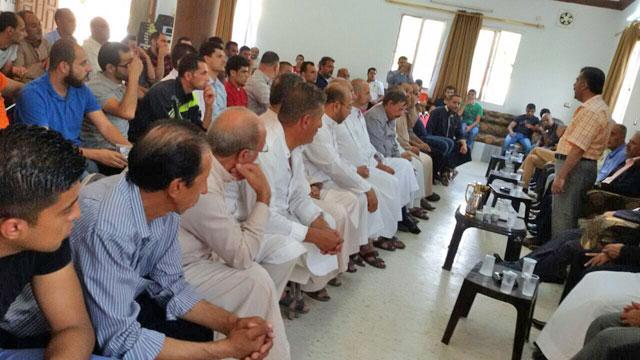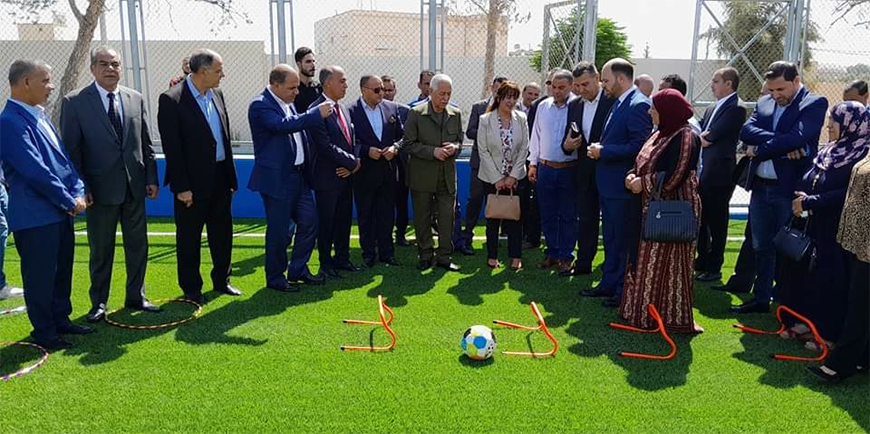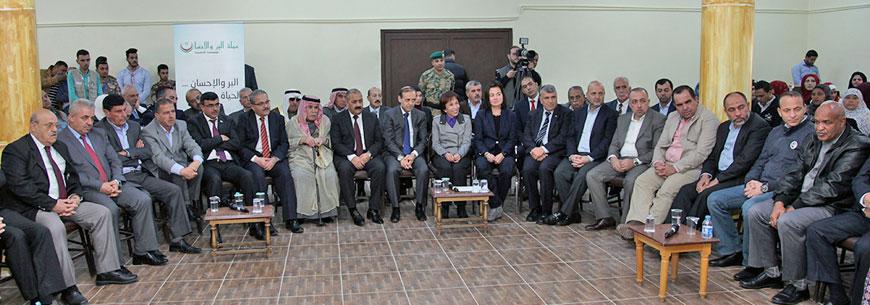You are here
Candidates in Irbid’s 2nd District relying on ‘traditional campaigning’
By Omar Obeidat - Aug 29,2016 - Last updated at Aug 29,2016

A candidate in Bani Kinanah District meets with residents in this recent photo (Photo courtesy of Bani Kinanah news Facebook page)
IRBID – The scene in Irbid’s second electoral district is unlike that in other large cities in the Kingdom, as candidates are relying more on connections than advertising or promoting their programmes.
The electoral constituency includes the northern district of Ramtha and Bani Kinanah, with nearly 145,000 eligible voters.
Nine lists have applied at the Independent Election Commission, representing 46 candidates, of whom 10 are women.
Walking in the streets of the towns of Bani Kinanah and Ramtha, one would find scattered promotion posters hanging on power poles, but they are few and far between.
According to residents of the northern districts, family ties and connections will be the decisive force in the September 20 parliamentary polls as candidates’ programmes on their own cannot attract supporters.
Sultan Hazza, a 42-year-old resident of the village of Hibras in Bani Kinanah, is one of a group of people in charge of the campaign for one of the candidates.
“What candidates need to do here is to visit voters at their homes because it is a more effective tool than advertisements, which could cost thousands of dinars,” he said.
Most of the candidates, Hazza said, are from the same families or tribes.
“You can find five people from one tribe running for the elections,” he noted.
“I’m using my connections to promote our candidate,” Hazza told The Jordan Times Saturday, adding that he is visiting relatives and friends to win their votes.
Kamel Obeidat, another resident of the district, also works voluntarily with a candidate. He said that people believe in parliamentary hopefuls’ promises of services rather than in their programmes.
“Candidates are judged by what they promise to do for voters in terms of services and jobs,” Obeidat argued, agreeing that connections matter more than programmes.
Ahmad Zou’bi, a university student from Ramtha, criticised candidates for relying on relatives and friends rather than programmes.
“We at home were visited by almost the majority of candidates, who wanted us to vote for them because of friendship or for being relatives.”
The talk of the town
At a gathering of a group of residents of Al Rafid village, the only topic discussed was the elections.
They were debating who is going to win, who is going to lose and why.
“Election day is approaching, so this is the hottest topic in town,” said Mohammad Khalaileh.
They all spoke passionately for the candidates they are supporting, strongly believing in their chances to win.
“Everywhere you go, you would find people talking only about the elections,” said Ahmad Awad, a Ramtha resident.
Young people seem to be engaged as well.
In the village of Kufr Soum, a group of university students have launched an initiative to host candidates and discuss their programmes.
“What we want to do is to judge them based on their programmes — what they can do for the area in terms of development and for the country as a whole,” said Jamal Obeidat, one of the students behind the initiative.
He said the group represents students from across Bani Kinanah, adding that young people want to vote for the candidates or lists that can convince them of their programmes.
Related Articles
IRBID — Youths in the northern governorate of Irbid say proposals for economic development plans are absent from candidates’ programmes, ahe
AMMAN — Royal Court Chief Yousef Issawi on Wednesday inaugurated several Royal initiative projects in the Ramtha and Bani Kinanah districts
BANI KINANAH, Irbid — HRH Princess Basma, the president of the Goodwill Campaign's higher committee, on Monday launched an initiative to pro


















